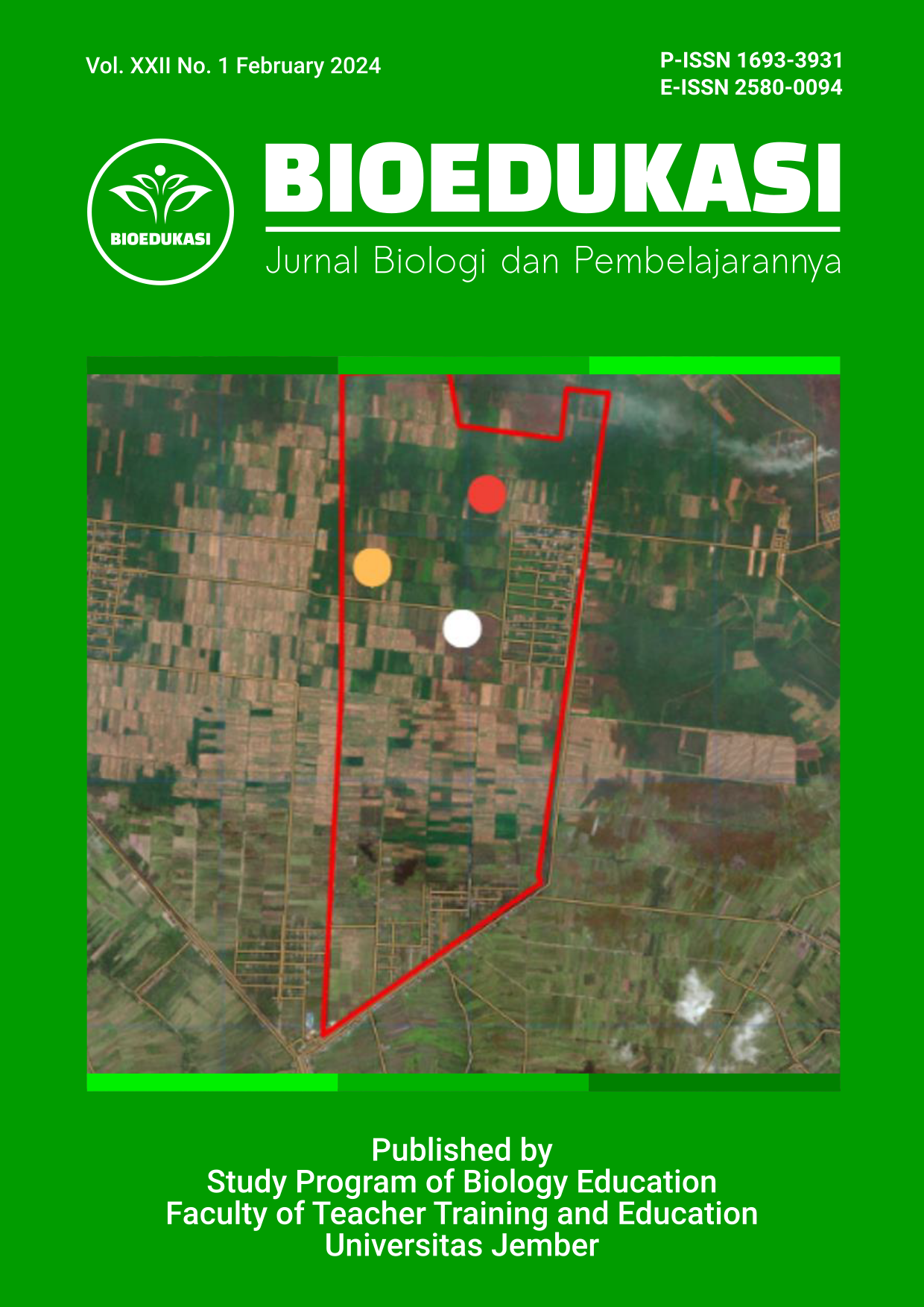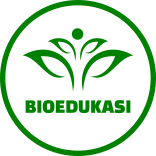Effectiveness of PjBL Based E-module Supported by Learning Journals in improving Students' Critical and Creative Thinking Skills
DOI:
https://doi.org/10.19184/bioedu.v22i1.43876Keywords:
Critical Thinking Skills, Creative Thinking Skills, E-module, PjBLAbstract
Effort to develop critical and creative thinking skills that 21st century students needs remain limited. Learning activities to practice these skills have not been implemented optimally and the teaching materials used also do not have indicators of these skills. Through PjBL-based electronic modules and with the help of learning journals, it is believed that students' critical thinking and creative thinking skills can be improved. This study uses two research groups, held on november till december 2022 the control class and the experimental class. The tool used includes essay questions tailored to the indicators. The ANOVA test shows that E module has a significant impact on students' critical thinking skills (α=0.00) and creative thinking (α=0.00). The e-module based on PjBL and supported by a learning journals is effective in improving both skills and is useful in teaching and learning process.
Downloads
References
Agustine, J., Nizkon, N., & Nawawi, S. (2020). Analisis keterampilan berpikir kritis peserta didik SMA kelas X IPA pada materi virus. Assimilation: Indonesian Journal of Biology Education, 3(1), 7–11. https://doi.org/10.17509/aijbe.v3i1.23297
Condliffe, B., Quint, J., Visher, M. G., Bangser, M. R., Drohojowska, S., Saco, L., & Nelson, E. (2017). Project-based Learning: a Literature Review. In mdrc : Building Knowledge to Improve Social Policy.
Ennis, R. H. (2011). Critical Thinking Assessment. Theory Into Practice, 32(3), 179–186.
Gao, X., Li, P., Shen, J., & Sun, H. (2020). Reviewing assessment of student learning in interdisciplinary STEM education. International Journal of STEM Education, 7(1). https://doi.org/10.1186/s40594-020-00225-4
Hadzigeorgiou, Y., Fokialis, P., & Kabouropoulou, M. (2012). Thinking about Creativity in Science Education. Creative Education, 03(05), 603–611. https://doi.org/10.4236/ce.2012.35089
Hidayati, A. R., Fadly, W., & Ekapti, R. F. (2021). Analisis Keterampilan Berpikir Kritis Siswa pada Pembelajaran IPA Materi Bioteknologi. Jurnal Tadris IPA Indonesia, 1(1), 34–48. https://doi.org/10.21154/jtii.v1i1.68
Insyasiska, D., Zubaidah, S., Susilo, H., Biologi, P., & Malang, U. N. (2015). Pengaruh Project Based Learning Terhadap Motivasi Belajar , Kreativitas , Kemampuan Berpikir Kritis , Dan Kemampuan Kogntif Siswa pada Pembelajaran Biologi. Jurnal Pendidikan Biologi, 7(1), 9–21. https://doi.org/http://dx.doi.org/10.17977/um052v7i1p9-21
Izzati, N. (2014). Pengaruh Penerapan Model Pembelajaran Berbasis Proyek Terhadap Kemampuan Berpikir Kreatif Mahasiswa (Studi Kuasi Eksperimen terhadap Mahasiswa Tadris Matematika IAIN Syekh Nurjati Cirebon). Eduma : Mathematics Education Learning and Teaching, 3(1). https://doi.org/10.24235/eduma.v3i1.7
Lai, C. F., Hwang, R. H., Chen, S. Y., Huang, H. M., & Wu, T. T. (2015). Influence of integrating creative thinking teaching into project-based learning courses to engineering college students. Proceedings of the 43rd SEFI Annual Conference 2015 - Diversity in Engineering Education: An Opportunity to Face the New Trends of Engineering, SEFI 2015.
Lindawati, Fatmariyanti, S. D., & Maftukhin, A. (2017). Improving Creative Thinking Skills by Implementing Project Based Learning on Human Organ System Material. Jurnal Radiasi, 3(1), 42–45. https://doi.org/10.2991/seadric-17.2017.81
Mou, T. Y. (2023). Online learning in the time of the COVID-19 crisis: Implications for the self-regulated learning of university design students. Active Learning in Higher Education, 24(2), 185–205. https://doi.org/10.1177/14697874211051226
Nugroho, E. S. B., Prayitno, B. A., & Maridi. (2017). Pengembangan Modul Berbasis REACT pada Materi Jamur untuk Meningkatkan Kemampuan Berpikir Kritis Siswa Kelas X SMA. Didaktika Biologi: Jurnal Penelitian Pendidikan Biologi, 1(1), 1–10.
Nurhayani, N., Syamsudduha, S., & Afiif, A. (2018). Kesulitan Guru Dalam Pengembangan Keterampilan Berpikir Tingkat Tinggi Siswa Dalam Pembelajaran Biologi Kelas Xii Di Sma Negeri 2 Gowa. Jurnal Biotek, 6(1), 93. https://doi.org/10.24252/jb.v6i1.5153
Ramalingam, D., Anderson, P., Duckworth, D., Scoular, C., & Heard, J. (2020). Creative Thinking: Skill Development Framework. The Australian Council for Educational Research.
Sastrika, I. A., Sadia, I. W., & Muderawan, I. W. (2013). Pengaruh Model Pembelajaran Berbasis Proyek terhadap Pemahaman Konsep Kimia dan Keterampilan Berpikir Kritis. 3(2). https://ejournal-pasca.undiksha.ac.id/index.php/jurnal_ipa/article/view/799
Tiantong, M., & Siksen, S. (2013). The Online Project-Based Learning Model Based on Student’s Multiple Intelligence. Clinical Insights: Stereotactic Body Radiation Therapy: Lung Cancer, 3(7), 53–72. https://doi.org/10.2217/EBO.13.11
Torres, J. O. (2019). Positive Impact of Utilizing More Formative Assessment over Summative Assessment in the EFL/ESL Classroom. Open Journal of Modern Linguistics, 09(01), 1–11. https://doi.org/10.4236/ojml.2019.91001
Treffinger, D. J., Young, G. C., Selby, E. C., & Shepardson, C. (2002). Assessing Creativity: A Guide for Educators. In Journal of Education and Learning (Issue December). The National Research Center on the Gifted and Talented.
Tsai, K. C. (2013). Being a Critical and Creative Thinker: A Balanced Thinking Mode. Asian Journal of Humanities and Social Sciences (AJHSS), 1(2), 1–9. https://ajhss.org/pdfs-1/Being a Critical and Creative Thinker.....pdf
Ulger, K. (2016). The Relationship between Creative Thinking and Critical Thinking Skills of Students. Hacettepe University: Journal of Education, 31(4), 695–710. https://doi.org/10.16986/HUJE.2016018493
Usman, Utari, E., & Yulita, N. (2020). Hubungan Berpikir Kritis dengan Kreativitas Siswa Melalui Mind Map pada Pembelajaran Biologi. 7(2), 32–41. https://journal.unilak.ac.id/index.php/BL/article/view/5299/2458
Uziak, J. (2016). A project-based learning approach in an engineering curriculum. Global Journal of Engineering Education, 18(2), 119–123.






